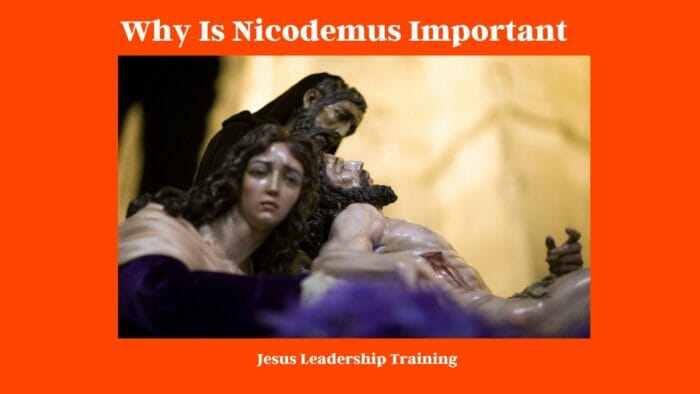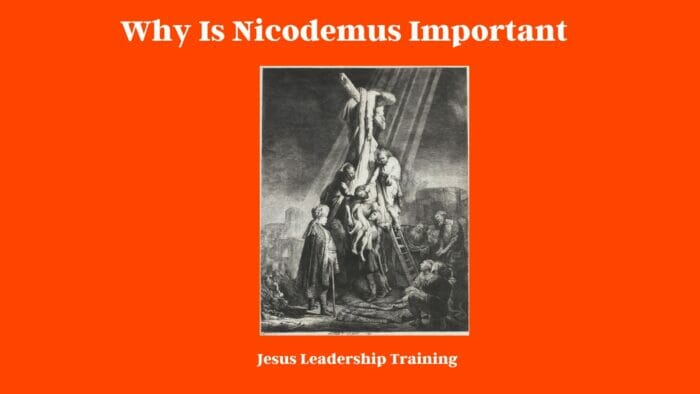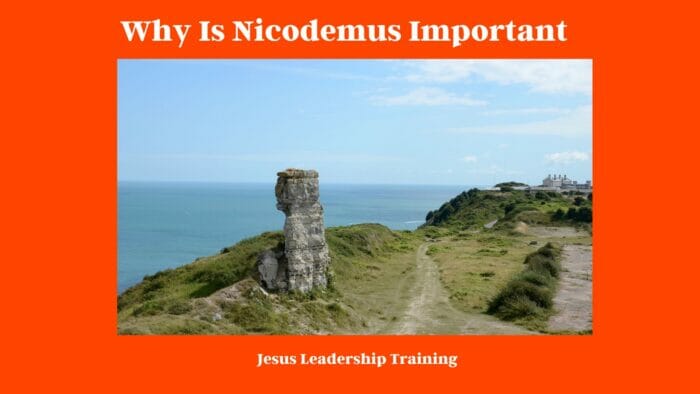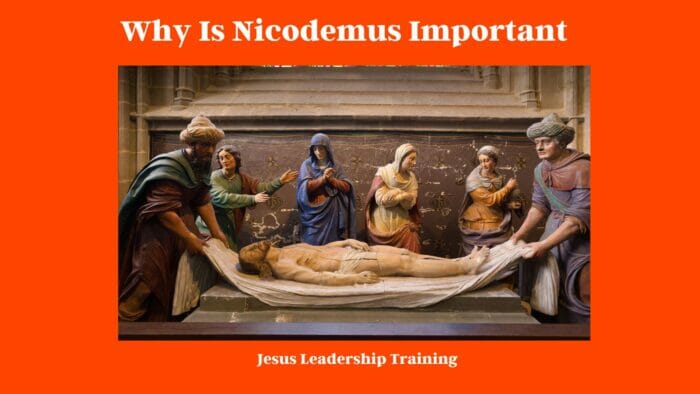Why Is Nicodemus Important – Nicodemus is a fascinating character in the Bible who shows us that the journey of faith is filled with questions, doubts, and transformation. As a Pharisee and a member of the Jewish ruling council, he risks his reputation to seek out Jesus for a deeper understanding of spirituality.
Their famous nighttime conversation about being “born again” serves as a timeless lesson on the complexities of faith and the courage it takes to challenge traditional beliefs.
Nicodemus’s later actions, like opposing the unjust arrest of Jesus and aiding in His burial, indicate a transformative change, inspiring countless generations to explore the multi-layered facets of their own spirituality.Understanding why Nicodemus is important can add depth to your biblical knowledge. His story gives us a unique perspective on spirituality, courage, and transformation.
Have you ever stumbled upon a character in a book or movie who doesn’t have the spotlight but leaves an indelible mark? Nicodemus is one such character in the Bible.
He’s not the protagonist, but his role offers invaluable life lessons and a complex tapestry of faith, struggle, and transformation. The story of Nicodemus enriches our understanding of spirituality and what it means to seek truth fearlessly.

Table of Contents
Why Is Nicodemus Important?
You might wonder, “So, what’s the big deal?” Well, Nicodemus’s importance lies in the way he represents the struggle for faith, the challenges faced when one questions existing religious norms, and the personal evolution that can result. Let’s delve deeper into these aspects.
You’re in for a treat because Nicodemus is one of those intriguing characters in the Bible who’s been talked about for ages. While the Bible doesn’t give us a ton of information about him, what we do have is pretty interesting. Plus, church traditions have certainly added some color to his story. So, let’s dive into this table of facts about Nicodemus, shall we? 😊
| Source | Facts About Nicodemus |
|---|---|
| Bible | Member of the Sanhedrin – He was a part of the Jewish ruling council. |
| Pharisee – Nicodemus was a Pharisee, indicating he was well-versed in Jewish laws and traditions. | |
| Visited Jesus at Night – He went to speak with Jesus under the cover of darkness, possibly to avoid public scrutiny. | |
| Intrigued by Jesus – He expressed genuine curiosity about Jesus and his teachings. | |
| Defended Jesus – Nicodemus urged his fellow leaders to give Jesus a fair hearing. | |
| Aided in Jesus’ Burial – Along with Joseph of Arimathea, he helped in the burial of Jesus, providing expensive myrrh and aloes. | |
| Church Traditions | Became a Disciple – Some traditions suggest that he later became a follower of Jesus. |
| Martyred for His Faith – Certain traditions hold that Nicodemus was martyred for becoming a Christian. | |
| Feast Day – In Eastern Orthodox and some Western Christian traditions, Nicodemus has a feast day celebrated on August 2nd. | |
| Gospel of Nicodemus – A non-canonical text attributed to him, although it’s not considered an authentic part of the New Testament. |
Hope you find this table as fascinating as Nicodemus’ character. Whether through Biblical accounts or church traditions, Nicodemus has a compelling story that has captivated believers for centuries. 📖

Nicodemus Story Summary
Lessons from the Story of Nicodemus
Nicodemus first appears in the New Testament as a Pharisee and a member of the Sanhedrin, the Jewish ruling council. His nocturnal meeting with Jesus, where they discuss being “born again,” has been dissected and debated over centuries. This interaction teaches us about vulnerability, the courage to seek truth, and the humility to accept when our existing knowledge is incomplete.
Nicodemus is a fascinating figure, and his interactions with Jesus provide us with some valuable lessons. Whether you’re a Bible aficionado or someone who’s just starting to explore, there’s a lot we can glean from his story. So, without further ado, here’s your table of lessons we can learn from the life of Nicodemus. 📚
| Lesson | Description and Application |
|---|---|
| Be Open-Minded | Nicodemus approached Jesus with genuine curiosity, even though he was part of a group that largely opposed Him. This teaches us the value of keeping an open mind and being willing to learn, regardless of our backgrounds. 🧠 |
| It’s Never Too Late to Seek Truth | Nicodemus was already a well-respected Pharisee when he met Jesus. His story reminds us that it’s never too late to seek out truth and deepen our understanding of faith. ⏳ |
| Courage to Defend What’s Right | Even in a hostile environment, Nicodemus spoke up for Jesus, advocating for a fair trial. This shows the importance of having the courage to stand up for what’s right, even when it’s unpopular. 🦸 |
| The Importance of Being Discreet | Nicodemus chose to visit Jesus at night, likely to avoid attracting attention. While we should be open about our faith, there are times when discretion is wise. 🌙 |
| Actions Speak Louder Than Words | Nicodemus didn’t just talk the talk; he walked the walk by helping with Jesus’ burial. His actions demonstrate the importance of living out our beliefs. 🚶♂️ |
| The Value of Sacrifice | Assisting in Jesus’ burial was a risky move and involved using expensive spices. This shows that faith often calls for sacrifice, whether it’s our time, resources, or reputation. 🎁 |
| Never Underestimate Individual Impact | While not one of the twelve disciples, Nicodemus’ contributions were significant. His life serves as a reminder that you don’t have to be in the spotlight to make a meaningful impact. 🌟 |
Hope this table gives you some food for thought! Nicodemus may not be one of the Bible’s most famous characters, but he certainly offers us some fantastic life lessons. So go ahead, apply them in your life and who knows, you might just end up being someone’s Nicodemus! 😉

Nicodemus Character Study
Analyzing Nicodemus’s character shows us the human aspects of faith. He wasn’t just a man of religion; he was a man in search of understanding. He was willing to risk his reputation and status to meet Jesus, and yet, he struggled with the concept of being born again. His journey serves as a mirror to those who find themselves caught between traditional beliefs and transformative experiences.
Nicodemus is one of those biblical characters who may not have a starring role but certainly leaves a lasting impression. He’s a bit like that guest star on your favorite TV show who steals the episode, you know? His few but meaningful appearances in the Bible offer a glimpse into his character traits. Let’s break it down in a handy table! 🌟
| Character Trait | Evidence and Interpretation |
|---|---|
| Intellectual and Curious | As a Pharisee and a member of the Sanhedrin, Nicodemus was well-educated in religious law. His questions to Jesus reveal a curious mind willing to explore deeper truths. 🎓 |
| Cautious but Brave | The fact that he visited Jesus at night shows caution, likely to avoid scorn from his peers. But it also took bravery to seek out Jesus given the tense political and religious climate. 🌓 |
| Ethical and Fair-minded | Nicodemus advocated for giving Jesus a fair trial, according to Jewish law, despite the overwhelming opposition from his peers. This demonstrates his commitment to fairness and justice. ⚖️ |
| Humble and Open to Learning | Even with his high social and religious standing, he approached Jesus as someone with something to learn, humbling himself before the new Rabbi on the block. 📚 |
| Compassionate and Respectful | He brought expensive myrrh and aloes for Jesus’ burial. This act not only showed respect for Jesus but also a certain kindness and compassion. 💐 |
| Discreet and Prudent | Nicodemus chose a discreet time to visit Jesus, indicating that he knew how to balance his curiosity and his responsibilities, demonstrating prudence in his actions. 🤫 |
| Action-Oriented | Beyond words and ideas, Nicodemus took concrete steps, like aiding in Jesus’ burial, which reflects a man of action willing to put his beliefs into practice. 🚶♂️ |
I hope this table helps you get a better grasp of who Nicodemus was as a character. He was a multi-dimensional individual with both strengths and weaknesses, much like all of us. Makes you think, doesn’t it? What would Nicodemus do if he were in your shoes today? 🤔

Did Nicodemus Become Born Again?
the question of whether Nicodemus became “born again” is a real head-scratcher, isn’t it? While the Bible doesn’t explicitly answer this question, various church traditions have offered some interesting perspectives on the matter. Let’s dive in, shall we? 🤿
Church Traditions on Whether Nicodemus Became Born Again
- Eastern Orthodox Tradition:
In Eastern Orthodox Christianity, Nicodemus is actually venerated as a saint! His feast day is celebrated on August 2nd. The tradition here implies that Nicodemus not only believed in Jesus but also became a devoted follower, suggesting that he experienced that “born again” transformation. 🌿 - Early Christian Writings:
There’s this ancient text called the “Gospel of Nicodemus,” also known as the “Acts of Pilate.” While it’s not part of the canonical Bible, it portrays Nicodemus as a disciple of Jesus. This could hint that Nicodemus had a transformative, “born again” experience. 📜 - Western Christian Tradition:
Some Western Christian traditions also celebrate Nicodemus as a saint, emphasizing his role in aiding Jesus’ burial. The fact that he’s honored as a saint often implies a sort of spiritual rebirth or sanctification. ⛪ - Liturgical Traditions:
In some Christian liturgies, the story of Nicodemus meeting Jesus is read out during significant occasions like Baptism services. The implication here could be a subtle nod to Nicodemus experiencing spiritual rebirth. 🌊 - Artistic Representations:
In Christian art, especially from the Medieval era, Nicodemus is sometimes depicted in scenes where Jesus is taken down from the cross or during His burial. Such portrayals often aim to highlight his transformation and commitment to Christ, suggesting a “born again” experience. 🎨
While none of these traditions offer conclusive evidence, they do paint a compelling picture of a man deeply affected by his encounters with Jesus. It’s kind of like reading between the lines, you know?
So, did Nicodemus become born again? While we may never get a definitive “yes” or “no” answer, the various traditions certainly make it an intriguing possibility. And hey, that’s the beauty of exploring age-old stories; they leave room for faith, interpretation, and a good ol’ spiritual mystery! 🕵️♀️📖
When Did He Meet Jesus?
Nicodemus met Jesus at night, a detail many believe signifies his inner turmoil and the clandestine nature of their meeting. Yet, his eventual actions, like standing against the arrest of Jesus and later taking care of Jesus’ body for burial, show a change of heart.
The convo between Jesus and Nicodemus in the Gospel of John is like one of those deep late-night talks you have with a friend that you can’t stop thinking about for days. It’s mysterious, it’s profound, and it leaves you going, “Whoa, I’ve got to digest this.” 🌙🤔
Major Points from Jesus’ Conversation with Nicodemus about Being Born Again
- You Must Be Born Again: Jesus kicks things off with a big statement that leaves Nicodemus scratching his head. Jesus says that to see the Kingdom of God, you must be born again. Mind-blowing, right? 🤯
- Literal vs. Spiritual Birth: Nicodemus initially takes Jesus literally and is utterly confused. He’s like, “How can an old man go back into his mother’s womb?” Jesus clarifies that He’s talking about a spiritual rebirth, not a do-over of physical birth. 🌈
- Water and Spirit: Jesus lays it down that being born of water (a reference to physical birth or perhaps baptism for some) and the Spirit is essential. It’s not an “either-or” but a “both-and” situation. 🌊🕊
- The Wind-Spirit Analogy: Jesus uses the wind as an analogy for the Spirit. You can’t see the wind, but you can see its effects. Similarly, you may not physically see the Spirit, but its transformative power is undeniable. 🌬️
- From Earthly to Heavenly Matters: Jesus chides Nicodemus a bit, saying if he doesn’t get the earthly things, how’s he going to understand if Jesus talks about heavenly things? It’s like Jesus is saying, “Buddy, we’re just scratching the surface here.” 🌍➡️🌌
- Son of Man and Salvation: Jesus references Himself as the “Son of Man” who must be lifted up (foreshadowing His crucifixion) so that whoever believes in Him may have eternal life. It’s the climax of the conversation and the core of the message. 🌟👑
- For God So Loved the World: This is where that famous line comes in, “For God so loved the world that He gave His one and only Son, that whoever believes in Him shall not perish but have eternal life.” It’s the thesis statement for the whole “born again” concept and the Christian faith at large. ❤️🌍
So there you have it! This conversation between Jesus and Nicodemus is jam-packed with transformative ideas that have been discussed, debated, and marveled at for centuries. It’s a spiritual goldmine! 💎💡
Tradition on Nicodemus
While the Bible does not definitively state whether Nicodemus was “born again,” Christian tradition and apocryphal texts often consider him a saint. Many believe his actions post-meeting Jesus indicate a transformative spiritual experience.
How Many Times Is Nicodemus Mentioned in the Bible?
What Does Nicodemus Mean in Hebrew?
Nicodemus is mentioned only three times in the New Testament, specifically in the Gospel of John. Despite his limited appearances, each mention is pivotal. The name “Nicodemus” itself is derived from the Hebrew name ‘Naqdimon,’ which means “innocent of blood” or “victorious among his people.”
Who is Nicodemus’ Wife?
The Bible remains silent on this subject, making it a topic of speculation and interpretation among scholars and theologians. Some argue that this absence allows the focus to remain on Nicodemus’s spiritual journey.
Spiritual Meaning of Nicodemus
Nicodemus’s interactions with Jesus give us a multi-layered narrative on spirituality. They show that faith is not a one-time event but a continuous journey, and even respected religious leaders have something to learn and unlearn.
The biblical name Nicodemus is a fascinating one, and its etymology is just as interesting. This article will explore the origins of the name and its meaning in its various languages.
Origin
The origins of the name Nicodemus are unknown, but it is likely derived from the Greek word “nikê”, which means “victory”.
Hebrew
In Hebrew, Nicodemus is spelled נקדמוס. The root of the name is the Hebrew verb “נקדם”, which means “to be in the presence of”. This suggests that Nicodemus was someone who was in the presence of God.
Greek
In Greek, Nicodemus is spelled Νικόδημος. The root of the name is the Greek verb “νικάω”, which means “to conquer”. This suggests that Nicodemus was someone who was victorious.
Aramaic
In Aramaic, Nicodemus is spelled נקדמא. The root of the name is the Aramaic verb “נקדם”, which means “to be in the presence of”. This suggests that Nicodemus was someone who was in the presence of God.
Latin
In Latin, Nicodemus is spelled Nicodemus. The root of the name is the Latin verb “nicere”, which means “to conquer”. This suggests that Nicodemus was someone who was victorious.
Overall, the etymology of the biblical name Nicodemus is quite complex and fascinating. The multiple meanings and origins of the name suggest that Nicodemus was someone who was in the presence of God, but also someone who was victorious.
Pharisees During the days of Jesus
When we think about the New Testament, the Pharisees often get a bad rap as the “bad guys,” right? But hold on a minute—there’s more to them than meets the eye. They were complex figures with deep religious convictions and traditions. Let’s unpack some of the key facts about the Pharisees during Jesus’ time, shall we? 📜🕍
| Aspect | Details and Insights |
|---|---|
| Origins | The Pharisees originated around the 2nd century BCE. Think of them as a long-standing institution by the time of Jesus. 🏛 |
| Name Meaning | The term “Pharisee” likely comes from the Hebrew word ‘Perushim,’ meaning “separated ones.” They were all about purity and piety. 🌿 |
| Beliefs | They believed in the resurrection of the dead, angels, and divine judgement—views not universally held among all Jewish groups back then. 👼 |
| Law and Tradition | Pharisees were super keen on not just the Torah but also oral traditions. They had rules and rituals for days! 📚 |
| Social Status | They were generally middle-class folks who had a lot of sway within the Jewish community. Not exactly the elite, but not commoners either. 🤝 |
| Numbers | There weren’t a ton of them. Estimates suggest maybe around 6,000 during the time of Jesus. A small but impactful group! 🎯 |
| Synagogues | They were often found teaching in synagogues and participated actively in religious debates. Kind of like the theological intellectuals of their time. 🎤 |
| Interactions with Jesus | The Gospels depict various confrontations between Jesus and the Pharisees, usually centered around interpretations of the law. It’s like a spiritual courtroom drama at times! ⚖️ |
| Political Views | They were largely apolitical, more focused on religious matters than the Roman occupation. Not the revolutionaries of their era. 🕊 |
| End of the Pharisees | After the destruction of the Temple in 70 CE, the Pharisees were one of the few Jewish sects to survive. They’re considered the spiritual ancestors of modern Rabbinic Judaism. 🌱 |
So there you have it! Understanding the Pharisees helps us get a fuller picture of the environment in which Jesus lived and taught. They were far more than just “villains” in a story; they were a dynamic group of people, shaped by their times and traditions, just like any of us today. Pretty fascinating, don’t you think? 🤔✨
Sanhedrin during the Days of Jesus
The Sanhedrin is often mentioned in the New Testament, but what do we really know about this influential group? It’s kind of like the Supreme Court of ancient Israel, a blend of religious and civil authority. Sounds intriguing, doesn’t it? So, let’s dive into the details! 🏛️📖
| Aspect | Details and Insights |
|---|---|
| What Was It? | The Sanhedrin was the supreme Jewish council in ancient Israel. Think of it as a mix of Congress and the Supreme Court. 🎩 |
| Membership | The council was composed of 71 members, including priests, elders, and scholars. A pretty elite group, wouldn’t you say? 🌟 |
| Leadership | It was headed by the High Priest. He was the big kahuna, sort of like the Chief Justice and Speaker of the House rolled into one. 🦁 |
| Location | The Sanhedrin usually met in a chamber within the Temple complex in Jerusalem. Holy ground for some high-stakes decisions! 🏰 |
| Jurisdiction | They had authority over religious, civil, and criminal matters, but their powers were somewhat limited under Roman rule. 🎭 |
| Interaction with Jesus | The Sanhedrin played a pivotal role in the trial and crucifixion of Jesus, as depicted in the Gospels. 🕊️ |
| Role in Jewish Society | This was the top-tier governing body for Jews, holding both religious and civil power. Kind of a big deal, right? 📜 |
| Roman Involvement | The Romans allowed the Sanhedrin some autonomy but had final say in matters like capital punishment. It was a delicate balance of power. ⚖️ |
| Sadducees vs. Pharisees | The Sanhedrin included both Sadducees (mostly priests and aristocrats) and Pharisees (learned laymen), and they often didn’t see eye to eye. Drama alert! 🚨 |
| End of the Sanhedrin | After the destruction of the Temple in 70 CE, the Sanhedrin lost much of its power and eventually disappeared. End of an era. 🌅 |
So, there you have it! The Sanhedrin was more than just a backdrop for New Testament stories; it was a complex and vital institution of its time. Understanding its role can really add some depth to your reading of the biblical narrative. Cool, huh? 🤓💡
What is the Gospel of Nicodemus
The “Gospel of Nicodemus” is a fascinating text that has intrigued scholars and the faithful alike for centuries. It’s like that extended director’s cut of a movie that didn’t make it to theaters but has some really interesting scenes. So, let’s roll up our sleeves and dig into what this enigmatic text is all about, shall we? 🕵️♂️📖
| Aspect | Details and Insights |
|---|---|
| Also Known As | This text is sometimes called the “Acts of Pilate.” Sort of like a movie with an alternate title. 🎬 |
| Date of Composition | Most scholars believe it was composed between the 3rd and 5th centuries CE. It’s like a long-lost ancient manuscript! 📜 |
| Canonical Status | This is a biggie. The “Gospel of Nicodemus” is NOT considered canonical by mainstream Christian denominations. Think of it as “extra material” rather than “core curriculum.” 🚫 |
| Primary Themes | The text delves into Jesus’ trial, crucifixion, and descent into Hell. It’s like a backstage pass to some of the New Testament’s most pivotal events. 🎭 |
| Nicodemus’ Role | Nicodemus is portrayed as a defender of Jesus. He’s like that one person who has your back when everyone else is skeptical. 👊 |
| Language | It was originally likely written in Greek or Latin, like many early Christian texts. 🏛️ |
| Popular in Medieval Times | The “Gospel of Nicodemus” was particularly popular in the Medieval Church and was translated into several languages. Imagine it as a medieval bestseller! 📚 |
| Theological Significance | While not considered canonical, it has been cited in theological discussions, especially regarding Christ’s descent into Hell. Think of it as an intriguing theological footnote. 📝 |
| Artistic Influence | This text has inspired various works of art, literature, and drama over the centuries. It’s got some serious cultural cachet! 🎨 |
So there you have it, a quick but comprehensive look at the “Gospel of Nicodemus.” While it may not be in the starting lineup of the New Testament, it’s certainly an intriguing “bench player” worth knowing about. Who knows, it might just add some extra layers to your understanding of Nicodemus and the biblical story! 🤔💡
Final Thoughts – Why Is Nicodemus Important
As we look back on Nicodemus’s story, we realize the importance of asking questions, challenging norms, and continuously evolving in our spiritual journeys. While he may not be the centerpiece of biblical history, Nicodemus serves as a compelling figure, drawing us into the complexities of faith and transformation.
Frequently Asked Questions
- Who was Nicodemus in the Bible?
Nicodemus was a Pharisee and a member of the Jewish ruling council, the Sanhedrin. - Why did Nicodemus meet Jesus at night?
The meeting likely occurred at night due to Nicodemus’s initial hesitation and fear of societal judgment. - What happened to Nicodemus after Jesus was crucified?
Nicodemus assisted in preparing Jesus’s body for burial, an act considered to be brave and a sign of transformation. - Is Nicodemus a saint?
In Christian tradition, especially in the Eastern Orthodox Church, he is venerated as a saint. - Did Nicodemus write any books in the Bible?
No, Nicodemus did not write any books in the Bible. - Is the concept of being born again exclusive to Nicodemus’s story?
No, the concept is prevalent throughout Christian teachings but is most famously discussed in the context of Nicodemus.



